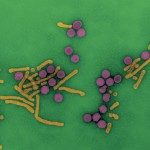Lien vers Pubmed [PMID] – 15249541
Int. Immunol. 2004 Sep;16(9):1275-82
Transgenic mice expressing human HLA class II molecules provide a useful model for identifying HLA-restricted CD4+ epitopes. However, the influence of endogenous murine H-2-restricted T cell responses on HLA-restricted responses is not known. In the present study, we show that HLA-DR1 transgenic mice deficient for H-2 class II expression (HLA-DR1+/+/IAbeta0/0) exhibit an equivalent expression level of the transgene HLA-DR1 and a similar diversity in the TCR repertoire, but a slightly different number of CD4+ peripheral T cells, when compared to HLA-DR1 transgenic mice in which H-2 class II molecules were retained (HLA-DR1+/+/IAbeta+/+). More importantly, a strong antigen-specific HLA-DR1-restricted response was observed in nearly all HLA-DR1+/+/IAbeta0/0 mice immunized with HBV envelope protein (HBs) or capsid protein (HBc), whereas weak HBs- or HBc-specific HLA-DR1-restricted responses were detected in half of the immunized HLA-DR1+/+/IAbeta+/+ mice. Conversely, strong HBs- or HBc-specific H-2-restricted T cell responses were detected in HLA-DR1+/+/IAbeta+/+ mice but not in HLA-DR1+/+/IAbeta0/0 mice. Our results indicate that the coexpression of endogenous H-2 class II molecules reduces the intensity of HLA-DR1-restricted antigen-specific responses in transgenic mice, by favoring murine over human MHC recognition and education. Thus, HLA-DR1+/+/IAbeta0/0 mice represent a better model for identifying and characterizing HLA-DR1-restricted epitopes relevant for human disease.

